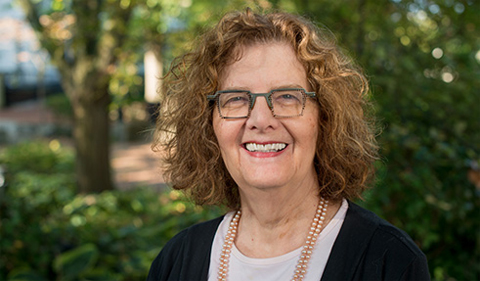Dr. Mara Holt, Associate Professor of English & Director of Composition, authored a book titled Collaborative Learning as Democratic Practice: A History (Urbana, IL: CCCC/NCTE 2018).
Collaborative learning is not only a standard part of writing pedagogy, but it is also a part of contemporary culture. Collaborative Learning as Democratic Practice: A History examines the rich historical and political contexts of collaborative learning, starting with John Dewey’s impact on progressive education in the early 20th century.
Holt describes her book in a post at the National Council of Teachers of English:
Did you know that collaborative learning has been around for over 100 years in the journals published by NCTE? It has taken various forms in different historical periods in the US, and it has usually responded to the cultural conditions of its time. When I became conscious of its cultural connections and the ideologies it reflects, I was able to look at my own practice with a critical eye, learning what messages I was communicating to my students without realizing it.
My book Collaborative Learning as Democratic Practice: A History shows how collaborative learning has been “discovered” at various times throughout the 20th and early 21st centuries, generally when participatory democracy is part of the national conversation. An example is during the 1930s Great Depression when collaborative learning was hailed by educators as supportive of successful collective action against economic disparities in the country. In the Cold War era of the 1950s, on the other hand, practitioners of collaborative learning saw it as a labor-saving device, apologizing for using it at all. In the late 1960s, collaborative learning returned to favor and was linked to students’ organized protests against the Vietnam War. Currently, collaborative learning can be seen as supportive of the non-hierarchical democratic structure of the Black Lives Matter movement.
John Dewey’s American Pragmatist philosophy can be seen at work in collaborative practices throughout the 20th and into the 21st centuries. Dewey was part of the lineage of a group of people that Louis Menand calls The Metaphysical Club. This group included philosopher Charles Pierce, psychologist William James, and Supreme Court justice Oliver Wendell Holmes. The men had either witnessed or fought in the American Civil War, and they had come out of the war disillusioned with the notions of certainty and idealism in which they had previously had faith. They set about developing a new set of ideals that connected philosophy with action, that assumed knowledge as consensual, provisional, and constantly negotiated….




















Comments